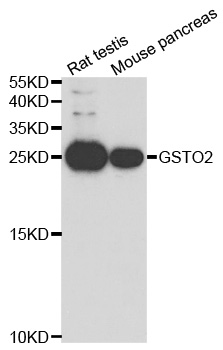Product Name :
GSTO2 polyclonal antibody Background :
GSTO1 (glutathione S-transferase omega 1), also known as p28 or GSTTLp28, is a 241 amino acid protein that localizes to the cytoplasm and contains both an N-terminal and a C-terminal GST domain. Expressed ubiquitously with highest expression in heart, liver and skeletal muscle, GSTO1 exists as a homodimer that functions as both a glutathione-dependent thiol transferase and a dehydroascorbate reductase. Specifically, GSTO1 catalyzes the reaction of glutathione with a wide variety of organic compounds to form thioethers, a process that is essential for the metabolism and detoxification of a variety of xenobiotics and carcinogens. Polymorphisms in the gene encoding GSTO1 may be associated with the development of childhood acute lymphoblastic leukemia, Parkinson’s disease and Alzheimer disease. GSTO2 (glutathione S-transferase omega-2) is related to GSTO1 and is expressed in a variety of tissues throughout the body where it functions to catalyze the conversion of RX and glutathione to HX and R-S-glutathione. Product :
Rabbit IgG, 1mg/ml in PBS with 0.02% sodium azide, 50% glycerol, pH7.2 Storage&Stability :
Store at 4°C short term. Aliquot and store at -20°C long term. Avoid freeze-thaw cycles. Specificity :
GSTO2 polyclonal antibody detects endogenous levels of GSTO2 protein. Immunogen :
Recombinant full length Human GSTO2. Conjugate :
Unconjugated Modification :
Unmodification
GSTO2 polyclonal antibody Background :
GSTO1 (glutathione S-transferase omega 1), also known as p28 or GSTTLp28, is a 241 amino acid protein that localizes to the cytoplasm and contains both an N-terminal and a C-terminal GST domain. Expressed ubiquitously with highest expression in heart, liver and skeletal muscle, GSTO1 exists as a homodimer that functions as both a glutathione-dependent thiol transferase and a dehydroascorbate reductase. Specifically, GSTO1 catalyzes the reaction of glutathione with a wide variety of organic compounds to form thioethers, a process that is essential for the metabolism and detoxification of a variety of xenobiotics and carcinogens. Polymorphisms in the gene encoding GSTO1 may be associated with the development of childhood acute lymphoblastic leukemia, Parkinson’s disease and Alzheimer disease. GSTO2 (glutathione S-transferase omega-2) is related to GSTO1 and is expressed in a variety of tissues throughout the body where it functions to catalyze the conversion of RX and glutathione to HX and R-S-glutathione. Product :
Rabbit IgG, 1mg/ml in PBS with 0.02% sodium azide, 50% glycerol, pH7.2 Storage&Stability :
Store at 4°C short term. Aliquot and store at -20°C long term. Avoid freeze-thaw cycles. Specificity :
GSTO2 polyclonal antibody detects endogenous levels of GSTO2 protein. Immunogen :
Recombinant full length Human GSTO2. Conjugate :
Unconjugated Modification :
Unmodification
-
 WesternBlot (WB) analysis of GSTO2 polyclonal antibody
WesternBlot (WB) analysis of GSTO2 polyclonal antibody
Bioworld Biotech only provide peptides for our antibodies and do not provide additional peptide customization services.
Price/Size :
USD 368/1mg/vial
Tips:
For phospho antibody, we provide phospho peptide(0.5mg) and non-phospho peptide(0.5mg).Describe :
Blocking peptides are peptides that bind specifically to the target antibody and block antibody binding. These peptide usually contains the epitope recognized by the antibody. Antibodies bound to the blocking peptide no longer bind to the epitope on the target protein. This mechanism is useful when non-specific binding is an issue, for example, in Western blotting (WB) and Immunohistochemistry (IHC). By comparing the staining from the blocked antibody versus the antibody alone, one can see which staining is specific; Specific binding will be absent from the western blot or IHC performed with the neutralized antibody.Formula:
Synthetic peptide was lyophilized with 100% acetonitrile and is supplied as a powder. Reconstitute with 0.1 ml DI water for a final concentration of 10 mg/ml.The purity is >90%,tested by HPLC and MS.
Storage:
The freeze-dried powder is more stable. For short time at 2-8°C. For long term storage store at -20°C.
Note :
This product is for research use only (RUO only). Not for use in diagnostic or therapeutic procedures.
 GSTO2 polyclonal antibody
GSTO2 polyclonal antibody  Datasheet
Datasheet COA
COA MSDS
MSDS SHIP
SHIP